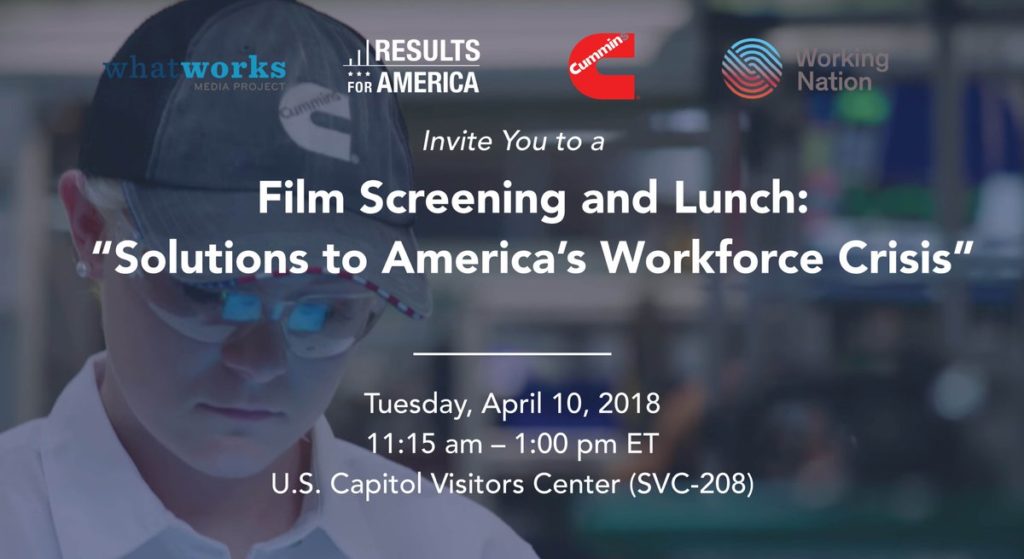
With the world focused on data privacy, another issue of national importance was discussed on Capitol Hill: adapting our workforce development programs with evidence-based research and bringing these solutions to scale.
WorkingNation, together with the What Works Media Project, Results for America, and Cummins, Inc., continued the conversation about bipartisan solutions during a film screening held April 10 at the U.S. Capitol. Congressional members and guests were treated to a viewing of What Works’ Solutions to America’s Workforce Crisis and our animated short Slope of the Curve.
The leader of the House education committee, Rep. Virginia Foxx, R-N.C., and Rep. Raja Krishnamoorthi, D-Ill., were on hand to show their support for Solutions, a powerful call-to-action for lawmakers to reach across political divides and deliver funding to training programs which invest wisely in workers.

Featured speaker and WorkingNation Executive Committee member Jane Oates, helped kick off the event by introducing Slope and its message to a receptive audience, which included our founder and CEO Art Bilger. The animated short outlines the rapid technological change happening across the nation and the need to create a workforce which can adapt to the pressures brought on by automation.
.@oates_jane of @workingnation and former Assistant Secretary of @USDOL ’s Employment and Training Administration introduces @workingnation’s latest animated short film #SlopeoftheCurve. pic.twitter.com/UwjBxckgLR
— Results for America (@Results4America) April 10, 2018
Our animated short set the table for remarks from Reps. Foxx and Krishnamoorthi, who each affirmed their support for skills training programs from Career and Technical Education (CTE) providers.
“I have always been a believer in evidence-based policy,” said Rep. Foxx. Foxx, who is featured in Solutions, also asked the U.S. Senate to pass the Strengthening Career and Technical Education for the 21st Century Act and increase funding for CTE. Yet there is little money spent on researching the effectiveness of these programs in improving student outcomes and even less to promote the ones that work.
Bolstering alternative career pathways is the underlying message of the 18-minute film Solutions, which followed the lawmakers’ comments. The documentary highlights the public-private partnerships which are quickly becoming a cornerstone for a revolution in higher education.
Solutions, made by award-winning filmmakers Kristi Jacobson and Mikaela Beardsley, tells the stories of three individuals whose lives were changed by the non-profit organization Per Scholas and a manufacturing apprenticeship from Trident Technical College and Cummins Inc. Their pathways to in-demand careers in cybersecurity, information technology, and advanced manufacturing may be different, but they are united by a common thread. Each subject is gaining new skills without going the traditional route of a four-year college.
With more than six million job openings and higher education slowly adapting to the new normal of rapid technological change, getting a better read on skills training is essential to keeping our workers moving forward.
The message shared by our organizations is underscored by the immediate necessity for awareness and action from all parties invested in the future of work. We are committed to documenting the stories of Americans who are forging their future careers through postsecondary education.
Our Do Something Awesome series highlights non-traditional education programs and technology bringing skills training to diverse populations, modernizing career and technical education and delivering a workforce to industries lacking skilled workers.
WorkingNation also believes in the power of storytelling to convey the idea that there is no “finish line” when it comes to preparing for the jobs of tomorrow. The impact of automation on the workforce is happening now and more experts agree that the majority of American workers will need retraining to take on jobs which require more than a high school degree.
It is an issue that is facing millions of Americans who are learning to navigate a job market that is skills-focused and places a premium on postsecondary certifications. There is evidence of the value that programs like Per Scholas and the Cummins apprenticeship bring for its students. Graduates like Jonathan, Taiheem, and Shannon are completing these programs with work-ready skills and earning a paycheck that provides economic independence and stability.
The shift to new thinking about the value of higher education is accompanied by many states introducing expanded efforts to modernize workforce development. States are taking advantage of federal funding from the Trump administration’s executive order to expand apprenticeships and other real-world training programs. Yet funding for the instruments that measure the success of the diverse range of workforce training programs is lacking. We support Results for America’s mission and the message of Solutions to increase data-driven research.
It is critical that governments at all levels and employers have the evidence-based tools to increase the transparency of taxpayer-funded programs which get results. Initiatives that deliver the best “bang for the buck” like Per Scholas epitomize the nimble and holistic approach that successful programs should have. They are reaching underserved populations and simultaneously helping close the skills gap.
Join the Conversation: Tell us your thoughts about the What Works Media Project film on our Facebook page.
© Copyright 2024 by Structural Unemployment, LLC dba WorkingNation